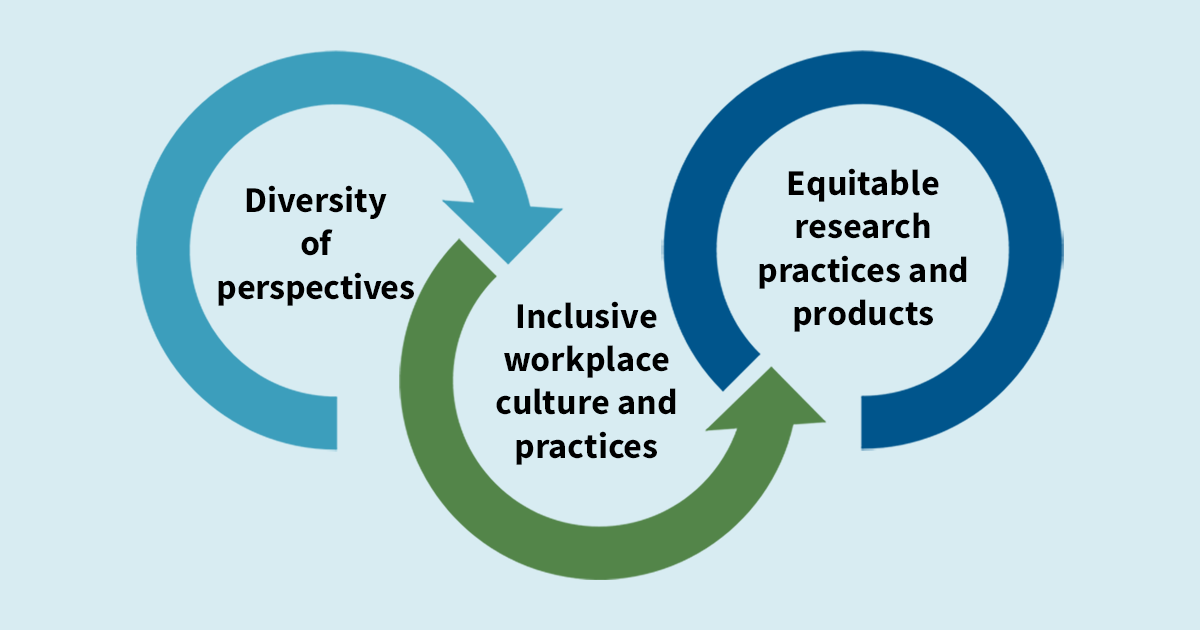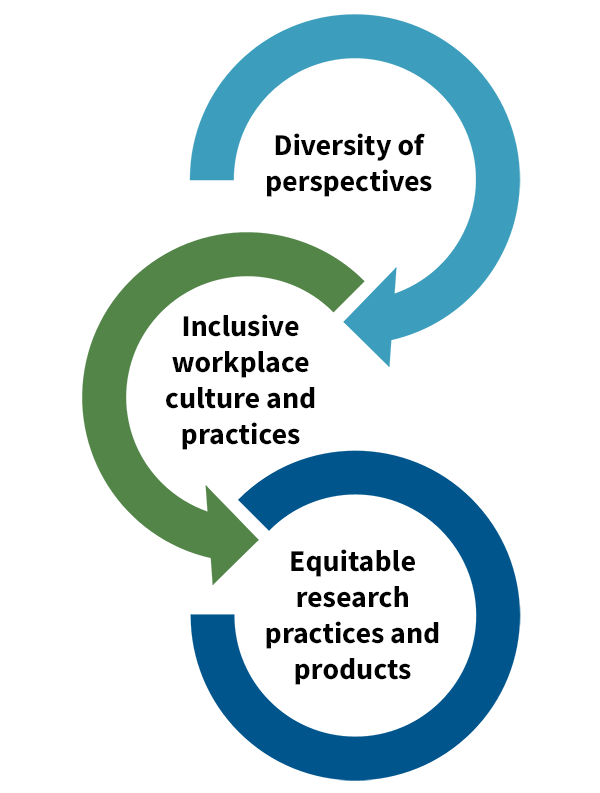MDRC’s Focus on Diversity, Equity, and Inclusion: From Commitment to Action

For more than 45 years, MDRC has pursued its nonpartisan mission of building evidence to improve policy and practice in the service of people from low-income backgrounds. Our work is focused on pressing societal issues, including reducing poverty and bolstering economic mobility; improving early childhood development, public education, and pathways from high school to college completion and careers; and reducing inequities in the criminal justice system. For the evidence we produce to meaningfully address those issues, MDRC researchers must understand how racial injustice and structural inequities can underlie unequal outcomes for different groups of people. This Issue Focus highlights MDRC’s efforts to incorporate principles of diversity, equity, and inclusion (DEI) into the content of our work and how we conduct it, providing examples of current and ongoing initiatives to advance those goals.
Diversity, Equity, and Inclusion at MDRC: Then and Now
Our institutional investment in diversity, equity, and inclusion began in the early 1990s when we asked outside consultants to assess staff attitudes about diversity at MDRC and make recommendations on the design and focus of a diversity program. In 1998, MDRC created the Diversity Council, comprising members from across the organization who are selected by their peers and who devote a portion of their time to Council business over the course of two-year terms. The Council spearheaded many initiatives and changes to practice that have become institutionalized. However, the responsibility for promoting diversity, equity, and inclusion does not rest with the Council alone. In 2017, MDRC deepened its commitment to advancing DEI by creating the Office of Outreach, Diversity, and Inclusion, which is tasked with coordinating and institutionalizing various efforts to strengthen DEI in the workplace. And more recently, the Council was renamed the Justice, Equity, Diversity, and Inclusion Advocacy Council to reflect MDRC’s strengthened dedication to those values.
 In 2019 and 2020, MDRC formally declared DEI an organizational priority to promote three mutually reinforcing goals:
In 2019 and 2020, MDRC formally declared DEI an organizational priority to promote three mutually reinforcing goals:
- Diversity of perspectives: Recruit, retain, and develop the talents of a diverse workforce that reflects lived experiences of populations most affected by the social issues MDRC studies.
- Inclusive workplace culture and practices: Employees and partners of diverse backgrounds and perspectives will enjoy a culture of mutual respect, inclusivity, and collegiality at MDRC and see that diversity is valued.
- Equitable research practices and products: Conduct rigorous research that conveys respect for individuals, avoids the perpetuation of stereotypes, acknowledges historical and social contexts, and engages diverse audiences.
Diversity of Perspectives
Publicizing Staff Demographic Characteristics: At MDRC, we know that measurement is fundamental to diagnosing problems and tracking change. To that end, we began publishing an overview of MDRC’s staff demographic characteristics on our website in December 2019. These data are updated annually.
Outreach to Minority-Serving Institutions: In 2019 and 2020, the Human Resources Recruitment Team broadened MDRC’s outreach by partnering with local universities in the cities where MDRC operates and with policy programs around the country that promote diverse talent.
Gueron Scholars Program: Our Gueron Scholars Program is building an on-ramp to policy research careers for students from traditionally underrepresented backgrounds in education and social policy research. The program offers paid internships for undergraduate and master’s-level students, as well as fellowships (with stipends) for doctoral students engaged in dissertation research.
Job Candidate Review and Selection: MDRC has piloted several new strategies in the review and selection of job candidates. For example, we assemble diverse hiring teams — reflecting different levels, roles, and backgrounds — to gain a fuller picture of the skills and experiences that are relevant to the positions we’re filling and to set expectations for a diverse pool of individuals when recruiting and screening candidates.
Inclusive Workplace Culture and Practices
MDRC’s DEI Strategic Initiatives Program: This program funds a wide range of employee-led activities that aim to attract and retain a diverse workforce, encourage and celebrate diversity at MDRC, and promote a thriving workplace culture. For example, the Men of Color in Research Affinity Group and Black Affinity Group are two of many self-directed groups that offer opportunities for MDRC staff to gather informally to build community and professional networks, share knowledge, raise social awareness, and support leadership development.
MDRC’s Mentoring Program: Launched in 2009, the mentoring program promotes a sense of belonging among staff and celebrates what each staff person uniquely brings to the table — in terms of identity, background, personality, talents, skills, experience, and more. The program is one tool we use to retain, engage, and develop a more diverse staff at MDRC. Mentoring at MDRC provides a space that supports community-building across departments, levels, and functions. More than 100 staff members participated in the mentoring program in 2019 as either mentors or mentees.
Critical Conversations and Celebrations: Through this new format for MDRC’s quarterly all-staff meetings, employees meet in small discussion groups that foster interaction and build community across roles, levels, units, and offices. Staff celebrate important milestones with their colleagues and engage in guided discussion on topics important to the organization, such as conversations about the goals of MDRC’s DEI Strategic Initiatives Program.
Training and Workshops: MDRC has provided workshop-style training to all staff on identifying and counteracting implicit bias and fostering inclusion. Building on this foundation, the staff-led Justice, Equity, Diversity, and Inclusion Advocacy Council hosted social identity reflection sessions and racial identity caucuses to facilitate ongoing conversations and learning. MDRC intends to continue providing DEI training and workshops to increase skills for building and maintaining an inclusive workplace.
Equitable Research Practices and Products
MDRC is committed to conducting rigorous research about what works to improve policy and practice, as well as learning how and why programs and policies make a difference. Our commitment to rigor extends to all our work — from impact analysis, to research-practitioner partnerships, to implementation research, to leveraging big data and human-centered design approaches. MDRC is committed to engaging in research partnerships that result in mutual learning so that practitioners and policymakers have the capacity to pursue learning agendas in their own contexts and sustain the impacts of promising solutions.
Equity Collaborative: In 2020, MDRC received foundation funding to establish the Equity Collaborative, which is charged with developing guidance to help our researchers make progress in applying principles of culturally responsive evaluation in our work. The Equity Collaborative is exploring:
- ways to contextualize, interpret, and write about our findings given structural barriers or systemic racism that may be present
- processes for obtaining consent and collecting data that create equal and respectful opportunities for participation
- culturally responsive research practices
- opportunities to actively include participants and program staff as partners in the research process
Looking Forward
Given the numerous strands of activity that are advancing our DEI agenda, MDRC recently formed a DEI Advisory Committee, a coordinating structure that includes representatives of the multiple groups that are moving this work forward. True to MDRC’s values and in the spirit of acknowledging that we do not have all the answers, we are committed to continuously learning about what works to become the type of organization we aspire to be — one that embraces staff diversity in every form, promotes equity among staff, supports inclusive workplace practices, and applies a critical lens to understanding how structural injustices affect the life chances of individuals who participate in our studies.
Sophia Sutcliffe and Ashley Wilson led a team that drafted this Issue Focus. They offer their thanks to the members of Human Resources; the Justice, Equity, Diversity, and Inclusion Advocacy Council; and the Equity Work Group who contributed — as well as to Crystal Byndloss for her leadership as the Director of Outreach, Diversity, and Inclusion.





